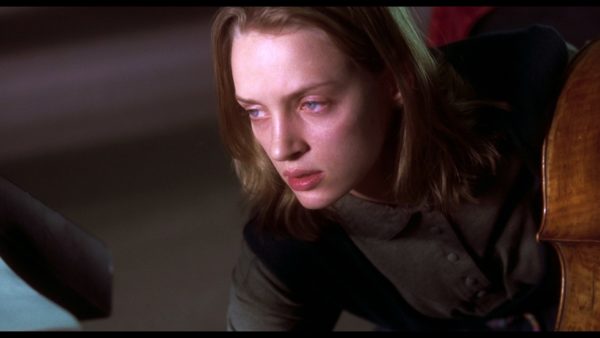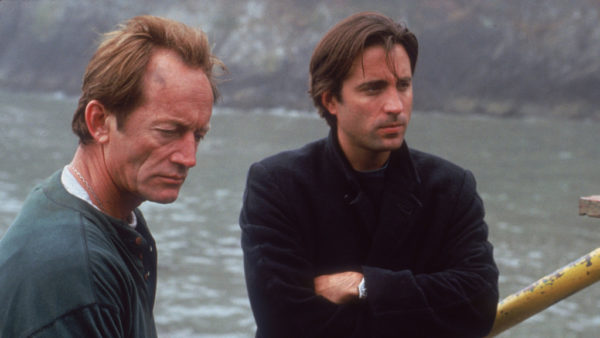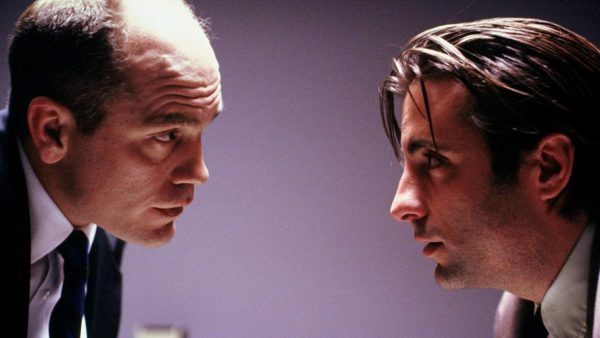
There’s just something that hits different about a “woman in danger” film. Perhaps it’s the fact that the subgenre was once extremely popular in the early-to-mid 90s and is now basically an endangered species?
1992’s Jennifer 8 is a prime example. Written and directed by British vet Bruce Robinson, the film is a police procedural about John Berlin (Andy Garcia) a police detective who becomes personally invested in a serial killer targeting women after Berlin falls in love with a blind witness, Helena (Uma Thurman).
Together with his (slightly doubting) partner and good friend Freddy Ross (Lance Henriksen), Berlin goes rogue, running afoul of Chief Citrine (Kevin Conway) and drawing the ire of colleagues like John Taylor (Graham Beckel). But after a deadly incident, Berlin becomes the prime suspect in the case and his actions are put under a microscope by investigator St. Anne (John Malkovich).

In many ways, Jennifer 8 is a fairly by the numbers early-90s thriller. Both the stock characters (the hard boiled detective, the damsel-in-distress) and the conventions (late night stake-outs, the omnipresent killer who always seems one step ahead) will be very familiar to audiences, particularly those familiar with the subgenre.
What helps the film stand out from the pack is, in large part, the quieter moments between characters and the cinematography by Conrad Hall, who takes the standard iconography and elevates it into beautifully composed visuals.
The film opens as Berlin returns from a disastrous one year stint in Los Angeles that nearly ruined his career. He and Terry are immediately called to the dump when a terrible discovery is made: the amputated hand of a young woman, the latest victim of the serial killer.
There’s a lot of exposition in these opening scenes as Robinson’s screenplay juggles Berlin’s history with Terry, the former’s anger management issues, and the history of the “Jennifer” case. This goes down easily thanks to Hall’s cinematography, which is renders the rain pouring down on excavators in a beautifully macabre fashion.

As the film progresses, not only does Hall make a character of the blind dormitory where Helena teaches and lives, he turns a standard issue stake-out into a high-octane winter shoot-out; he mixes unsettling sensuality, perversion and voyeurism in a scene where Helena is unknowingly photographed getting into the bath; and he stages a suitably shocking twist ending wherein Helena and Terry’s wife Margie (Kathy Baker) battle the killer.
Even something as pedestrian as Berlin realizing all of the victims are blind is elevated by Hall’s framing of a crosswalk signal on a rainy night.
Of course, none of this would matter if the characters weren’t richly fleshed out. In the 42 minute featurette on the Scream Factory disc, Robinson admits he wanted an older actor (he name drops Al Pacino) and it’s true that Garcia sometimes struggles to convey Berlin’s world-weariness. More often than not, he comes off as either a hot head or an impetuous go-getter, but it still works for the “dogged police detective” character type.
Garcia does have good chemistry with Thurman, though Berlin’s friendship with Freddy is the heart of the film. There are plenty of small character elements between the two, particularly in the small beats around Berlin’s attempt to stop smoking. These moments prove vital for contextualizing the depth of their relationship and extend to Berlin’s interactions with Margie (a few brief scenes, including a pair of meaningful hugs with Berlin, confirm just how exceptional Baker is at creating a character with virtually no screen time).

The film eventually gets bogged down in standard police procedural details and a boring killer reveal, though the interrogation sequence between Berlin and St. Anne shakes off the ennui and crackles with tension. It’s enough to make you wish Malkovich were a larger part of the film (possibly as a secondary antagonist).
Overall, Jennifer 8 is worth recommending thanks to Hall’s cinematography, as well as the relationship between Berlin and Freddy. There’s an inherent sweetness to the romance, despite the fact that it a) obviously isn’t super appropriate from a 2024 lens and b) occasionally plays a little syrupy when paired with the murder investigation.
Still, as an archival relic of a bygone Hollywood era, Jennifer 8 remains an entertaining thriller. 3.5/5
Other Observations:
- Easily the main reason to pick up the Scream Factory disc is the inclusion of the Extended Cut of the film, which runs approximately five mins longer and features an alternative ending that gives Berlin more to do and feels less abrupt.
- There’s also the aforementioned featurette “Is It Dark Yet: Looking Back At Jennifer 8” which includes interviews with Robinson, Garcia and Henriksen (sadly no Thurman). There was apparently a great deal of studio interference during production, including a slashed budget, the attempted firing of Hall (!), and a battle over the composer (Robinson’s choice, Christopher Young, ultimately got the job and his score is beautifully haunting and appropriate). The interviews are surprisingly candid and it is evident that Robinson still hasn’t recovered from the experience (he famously retired from filmmaking for 17 years following completion of the film).
Jennifer Eight: Special Edition is now available for purchase from Scream Factory